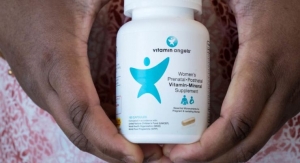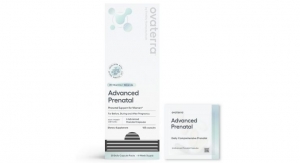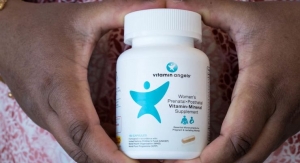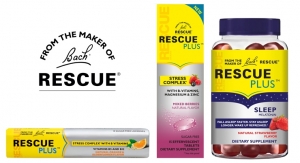Michele McRae, CN, Senior Director, Formulation, Research & Quality, Rainbow Light08.18.14
Every mother-to-be knows the importance of proper nutrition during pregnancy. But with so much going on during those nine months, it can be tough to make sure they actually get all the vitamins and nutrients they and their developing baby need the most.
Regardless of the trimester, every woman should incorporate a core set of vitamins into her diet. That way, she can make sure her body remains healthy and strong, while also ensuring the healthy growth and development of her baby. It’s a good idea to start taking a prenatal multivitamin as soon as she begins trying to conceive, and to continue taking a prenatal all the way through pregnancy and for as long as she nurses her baby. This will help to replenish her body and ensure the baby gets the essential nutrients necessary for healthy development.
With so much to remember, it is always helpful to discuss key vitamins pregnant women need.
Folic Acid
Also known as folate, folic acid plays a crucial role in the production of the baby’s red blood cells, as well as aiding neural tube development. Folic Acid supplementation throughout pregnancy will significantly reduce the risk of neural tube or spinal cord defects. The recommended daily value is between 600-800 mcg.
In addition to taking daily prenatal vitamins, women can help reach their recommended folic acid intake by including these foods in the diet:
Cooked lentils
Cooked spinach
Cooked broccoli
Orange juice
Vitamin B12
This powerful vitamin is important for battling fatigue and supporting a woman’s energy levels throughout the day. Critically, it also supports healthy neural development for babies.
The recommended daily value is only 8 mcg. Research and studies continue to show the health and safety benefits of higher B12 levels.
Getting the daily dose of B12 can also be done by consuming these foods:
Tuna
Low-Fat Milk
Eggs
Any fortified breakfast cereal
Zinc
Most women fail to get the recommended daily dose of zinc in their diet, even though it is only 15 mg for expectant mothers. It is particularly difficult to achieve for vegetarians or women on a mainly organic diet.
Zinc is more difficult for to absorb through plant foods, so consumers who do not have a regular intake of foods that contain zinc are unlikely to get enough through diet alone.
Some great sources of zinc can be found through prenatal vitamins or in these foods:
Chick peas
Oysters
Turkey
Crab meat
Any fortified breakfast cereal
Iron
Iron is one of the most important, but also one of the most overlooked nutrients that a woman needs during pregnancy. Essential in preventing anemia during pregnancy, iron is an important part of keeping both mother and baby healthy. It is important to take iron throughout pregnancy, from conception to birth and when nursing, or even before women get pregnant.
Some people are more susceptible to anemia than others. Regardless of risk factors, taking an iron supplement or multivitamin is highly recommended, as is incorporating the following foods into the diet:
Dried fruit
Nuts
Eggs
Kidney beans
Cooked spinach
Red meat
While these specific vitamins are important for all women, it’s especially important to remember that, during pregnancy, there is a vital need to nourish the baby. Paying attention to recommended dosages and obtaining specific nutrients will keep both mom and baby healthy and strong throughout the pregnancy.
It is also important to remember that a woman’s age plays a large role in what, and how many nutrients she needs during pregnancy. With more women over the age of 35 now having children, it is crucial that they remain aware of the different nutrients and levels needed to ensure their baby’s health.
Statistically, when a woman is pregnant over the age of 35, her risk of gestational diabetes, as well as her risk of developing high blood pressure, doubles. There is also an increased risk of placental issues, and a higher risk of birth defects or premature birth.
Rainbow Light has created the first ever prenatal vitamin for women over 35, Embrace Prenatal 35+ Multivitamin, specially formulated to provide women with the recommended dose of vitamins and nutrients needed to help them have a healthy pregnancy and a healthy baby. And remember, while there are some increased risks after age 35, it’s important to keep in mind that they have a 99.7% chance of having a healthy, normal baby.
In addition to taking recommended prenatal vitamins, here are a few other suggestions for 35+ moms to be:
Vitamins C, D and B6: Targeted nutrients to prevent reduce risk of preeclampsia
Magnesium: Great for easing muscle aches and general body discomfort
Calcium: Supports bone growth and helps prevent potential bone erosion due to age
Bioflavonoids: Vitamin C, Chromium, Zinc, K1 and 45mcg K2: Taken to strengthen, stabilize and improve circulation & connective tissue (i.e. the placenta and uterine wall) strength, stabilize blood pressure
Nutrients are vital for overall health, and women of all ages looking to conceive have an even greater need to provide their baby with the recommended vitamins. Whether through diet, prenatal vitamins or a combination of both, all healthy choices made by mom will help keep them, and their baby, healthy and strong.
Michele McRae is a certified nutritionist and the senior director of formulation, research & qualityat Rainbow Light.
Regardless of the trimester, every woman should incorporate a core set of vitamins into her diet. That way, she can make sure her body remains healthy and strong, while also ensuring the healthy growth and development of her baby. It’s a good idea to start taking a prenatal multivitamin as soon as she begins trying to conceive, and to continue taking a prenatal all the way through pregnancy and for as long as she nurses her baby. This will help to replenish her body and ensure the baby gets the essential nutrients necessary for healthy development.
With so much to remember, it is always helpful to discuss key vitamins pregnant women need.
Folic Acid
Also known as folate, folic acid plays a crucial role in the production of the baby’s red blood cells, as well as aiding neural tube development. Folic Acid supplementation throughout pregnancy will significantly reduce the risk of neural tube or spinal cord defects. The recommended daily value is between 600-800 mcg.
In addition to taking daily prenatal vitamins, women can help reach their recommended folic acid intake by including these foods in the diet:
Cooked lentils
Cooked spinach
Cooked broccoli
Orange juice
Vitamin B12
This powerful vitamin is important for battling fatigue and supporting a woman’s energy levels throughout the day. Critically, it also supports healthy neural development for babies.
The recommended daily value is only 8 mcg. Research and studies continue to show the health and safety benefits of higher B12 levels.
Getting the daily dose of B12 can also be done by consuming these foods:
Tuna
Low-Fat Milk
Eggs
Any fortified breakfast cereal
Zinc
Most women fail to get the recommended daily dose of zinc in their diet, even though it is only 15 mg for expectant mothers. It is particularly difficult to achieve for vegetarians or women on a mainly organic diet.
Zinc is more difficult for to absorb through plant foods, so consumers who do not have a regular intake of foods that contain zinc are unlikely to get enough through diet alone.
Some great sources of zinc can be found through prenatal vitamins or in these foods:
Chick peas
Oysters
Turkey
Crab meat
Any fortified breakfast cereal
Iron
Iron is one of the most important, but also one of the most overlooked nutrients that a woman needs during pregnancy. Essential in preventing anemia during pregnancy, iron is an important part of keeping both mother and baby healthy. It is important to take iron throughout pregnancy, from conception to birth and when nursing, or even before women get pregnant.
Some people are more susceptible to anemia than others. Regardless of risk factors, taking an iron supplement or multivitamin is highly recommended, as is incorporating the following foods into the diet:
Dried fruit
Nuts
Eggs
Kidney beans
Cooked spinach
Red meat
While these specific vitamins are important for all women, it’s especially important to remember that, during pregnancy, there is a vital need to nourish the baby. Paying attention to recommended dosages and obtaining specific nutrients will keep both mom and baby healthy and strong throughout the pregnancy.
It is also important to remember that a woman’s age plays a large role in what, and how many nutrients she needs during pregnancy. With more women over the age of 35 now having children, it is crucial that they remain aware of the different nutrients and levels needed to ensure their baby’s health.
Statistically, when a woman is pregnant over the age of 35, her risk of gestational diabetes, as well as her risk of developing high blood pressure, doubles. There is also an increased risk of placental issues, and a higher risk of birth defects or premature birth.
Rainbow Light has created the first ever prenatal vitamin for women over 35, Embrace Prenatal 35+ Multivitamin, specially formulated to provide women with the recommended dose of vitamins and nutrients needed to help them have a healthy pregnancy and a healthy baby. And remember, while there are some increased risks after age 35, it’s important to keep in mind that they have a 99.7% chance of having a healthy, normal baby.
In addition to taking recommended prenatal vitamins, here are a few other suggestions for 35+ moms to be:
Vitamins C, D and B6: Targeted nutrients to prevent reduce risk of preeclampsia
Magnesium: Great for easing muscle aches and general body discomfort
Calcium: Supports bone growth and helps prevent potential bone erosion due to age
Bioflavonoids: Vitamin C, Chromium, Zinc, K1 and 45mcg K2: Taken to strengthen, stabilize and improve circulation & connective tissue (i.e. the placenta and uterine wall) strength, stabilize blood pressure
Nutrients are vital for overall health, and women of all ages looking to conceive have an even greater need to provide their baby with the recommended vitamins. Whether through diet, prenatal vitamins or a combination of both, all healthy choices made by mom will help keep them, and their baby, healthy and strong.
Michele McRae is a certified nutritionist and the senior director of formulation, research & qualityat Rainbow Light.





















